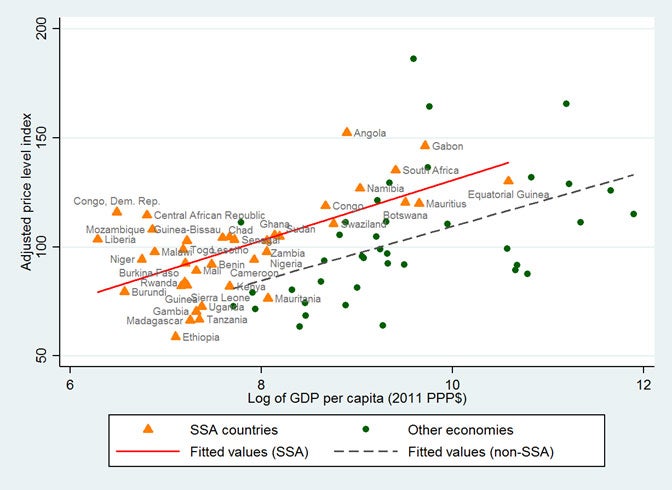A comparison of costs of living across major cities in the world regularly intrigues people. The latest annual report by the Economist Intelligence Unit (EIU), for example, points to Singapore as the most expensive city to live in. The cheapest city in the ranking of 133 cities is Lusaka in Zambia, followed by two Indian cities Bangalore and Mumbai.
The index created by the EIU for ranking world cities encompasses the prices of a variety of goods and services, yet many of those items are what typically consumed by foreign residents with different tastes and budgets from local residents. While it is very interesting to look at which cities are expensive from a standpoint of expats, I instead wanted to know which cities are more/less expensive to live in for the locals, by taking into account their different income levels.
A recent study that I prepared with co-authors, Is living in African Cities Expensive?, reveals how living in Sub-Saharan African cities is expensive relative to their low income levels. Our key finding is that despite their lower income levels, living in African cities is costly. Compared with countries at comparable income levels, the prices of goods and services consumed by households in urban Africa are around 30% higher. Particularly expensive are food and non-alcoholic beverages (35%), housing rent (55%), and transport (42%)—i.e., household expenditure on purchase of vehicles, operation of personal transport equipment, and transport services.

Source: Nakamura et al (2016)
A central challenge for our study was that globally comparable price information is rarely available. We overcame this challenge by taking advantage of new data prepared by the 2011 International Comparison Program (ICP), which reported national price levels for various types of goods and services. To compare costs of living in cities across countries, we adjusted price levels in African countries from national to urban levels based on known capital city-to-national price ratios, and compared these with price levels of other countries that had collected price surveys predominantly in urban areas.
Our finding that living in African cities is highly costly illuminates various underlying problems. The high costs not only make cities less livable, but also limit the benefits of urban economy. Because food and building costs are high, families sacrifice on health and decent housing. Because commuting is not only slow but expensive, workers find it difficult to find and keep jobs that match their skills. And worker’s need for higher wages to compensate for the high cost of living makes firms less productive and competitive.
Our research is a background study for a forthcoming report, “ Opening Doors to the World: Building African Cities that Work,” which discusses how crowding and missing physical connections contribute to the high costs of living in urban Africa. The overview of the report has been published as a part of the latest Africa’s Pulse.


Join the Conversation